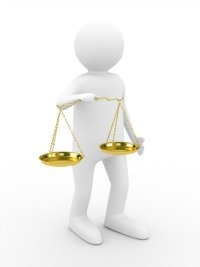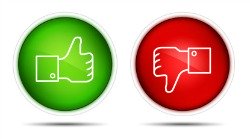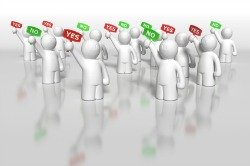The role of judgment in decision making
 Judgment has a number of meanings, so some additional clarity is needed. To address our questions on judgment and decision making, we are excluding specific legal and religious definitions. For our purposes, we will confine the meaning of judgment to:
Judgment has a number of meanings, so some additional clarity is needed. To address our questions on judgment and decision making, we are excluding specific legal and religious definitions. For our purposes, we will confine the meaning of judgment to:
- An ability, capacity, or faculty to make considered and effective decisions, come to sensible conclusions, perceive and distinguish relationships, understand situations, and form objective opinions especially in matters that affect action.
- The internal thinking, cognitive process or act of reaching a decision, drawing sound conclusions, forming an opinion, or making critical distinctions, about people, situations, ideas or events through assessment, comparison, and/or deliberation.
- The opinion, conclusion, determination, or outcome produced from exercising or demonstrating judgment.
Judgment in the context of decision making could be summarized as:
- The ability or capacity to decide
- The thought processes used to decide
- The decision outcome that comes from exercising judgment
Is judgment a skill?
Item one from the preceding summary suggests that, to some extent, judgment is a skill. O*NET online, a partner to the American Job Center, provides some confirmation. They list "Judgment and Decision Making" as a skill, providing the importance and level for their inventory of occupations. Some level of importance is shown for all occupations, indicating that this ability has broad application and relevance.
Thought or cognitive processes used in judgment fall into the realm of psychology. The popular Myers-Briggs indicator points to a personality type that has a preference toward Judging (versus Perceiving). This pair describes whether you extravert (act in the outer world) when you are making decisions or when you are taking in information. The type indicator suggests that people who tend to focus on making decisions have a preference for Judging. They like when things are decided. In contrast, people who focus on Perceiving prefer to keep options open to gather more information.
Some additional work (Thompson, 2009) has been done to correlate the Myers Briggs Type Indicator (MBTI®) assessment and other popular tools that can help in determining individual talents and preferences. These tools are often used for helping to identify possible careers, or they can suggest focus areas for skill or performance development that may be important in managerial judgment. One interesting example shows correlation between Judging (MBTI) and the Analytical, Discipline, and Focus, themes from the StrengthsFinder® tool.
Where does judgment go wrong?
 Answering this question has provided the motivation for a tremendous amount of research. The resulting investigations have identified a number of places where our judgment systematically deviates from ideal standards, or behavior that we expect should occur. (See our article on thinking biases for a summary of some common errors.) Decisions made by experts and professionals also display these departures from expected judgment.
Answering this question has provided the motivation for a tremendous amount of research. The resulting investigations have identified a number of places where our judgment systematically deviates from ideal standards, or behavior that we expect should occur. (See our article on thinking biases for a summary of some common errors.) Decisions made by experts and professionals also display these departures from expected judgment.
The good news is that these flaws in judgment and decision making are generally not arbitrary. In his book chapter, "Decision behaviour - Improving expert judgement", Dr. Geir Kirkebooen suggests, " If the biases and their causes can be identified, it should be possible to correct them." He also suggests that the key cause for these judgment biases is the limitation of our cognitive processes. Our approaches used for simplification lead to predictable and systematic biases.
Improving judgment in decision making
Dr. Kirkebooen summarizes a number of findings that may provide help in improving our judgment when making decisions. However, one common belief that he discredits is that experience improves decision quality, citing evidence that shows the observed accuracy of expert judgments is not related to experience.
He also identifies some improvement strategies that the evidence (or lack of evidence) suggests are not effective. In particular:
- Incentives that reward higher decision quality - These motivate more effort, but it is suggested that accuracy is not improved because people do not possess the thinking capacity needed to enable better decisions. Essentially, we humans need to simplify, leading to the errors mentioned previously.
- Increased decision accountability - Again, this inspires additional work, but also leads to biases to gain favor with those in authority and focus on easily justified elements of a decision.
Kirkebooen identifies cognitive and technological strategies as two areas where evidence has shown that judgment in decision making can be improved. Here are some methods that his research has identified as being effective:
- Take an outside view - Changing from an inside view to an outside view motivates ignoring the details of the specific case to look at the statistics of a class of similar cases. This is similar to our tip on getting an outside opinion.
- Consider the opposite - Ask the question, "What are some reasons that my initial judgment might be wrong?" This motivates seeking disconfirming evidence that makes the gathered information more representative of the likely outcome, reducing some of the systematic thinking errors.
 Combine the individual judgments of a group - Aggregating the decisions of an appropriately formed group has been shown to be more accurate than the judgment of experts.
Combine the individual judgments of a group - Aggregating the decisions of an appropriately formed group has been shown to be more accurate than the judgment of experts.- Automate repeatable decision making situations - For certain circumstances, linear models have methodically outperformed the experts, suggesting that recurring decisions should be automated to a much greater extent.
Some final noteworthy conclusions from Dr. Kirkebooen's work:
- Experts are still needed as they know the information that should be considered in forming judgments.
- In the context of judgment and decision making, decision support systems are incredibly underused.
References:
Kirkebooen, Geir (2009). Decision Behaviour - Improving Expert Judgement, In Knut Fredrik Samset; Kjell J. Sunnevag & Terry Williams (ed.), Making Essential Choices with Scant Information: Front-end Decision Making in Major Projects. Palgrave Macmillan. ISBN 9780230205864. Chapter 9. s 169 - 194
Thompson, Dick. The Link Between the MBTI® Instrument and Other Popular Instruments. High Performing Systems, Inc., 23 Sept. 2009. Web. 27 Oct. 2012.
Return from Judgment and Decision Making to Decision Making Articles

